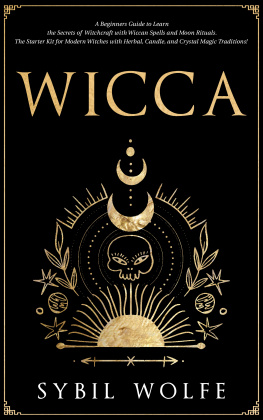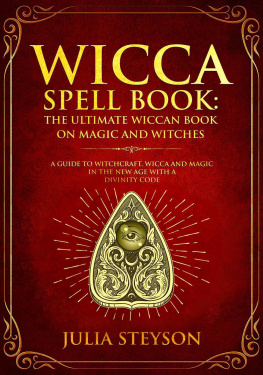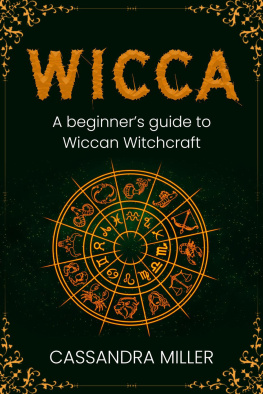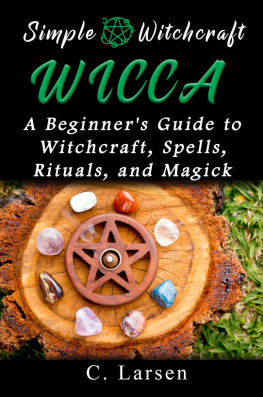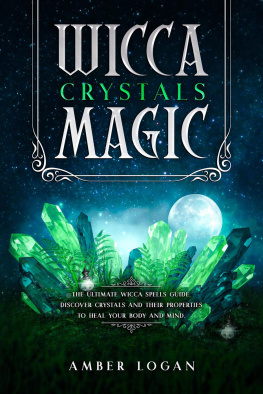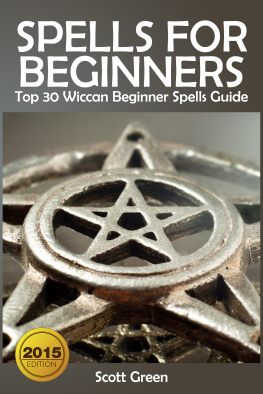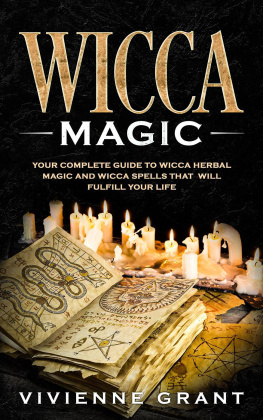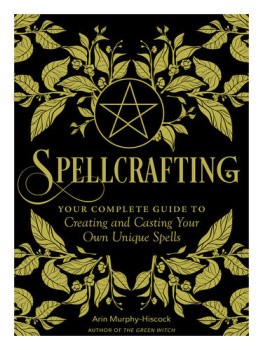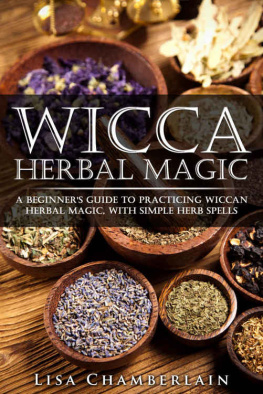Table of Contents
W ICCAN SPELLS
for beginners
Simple magic spells & rituals to improve your health,
your wealth and your relationships fast
By: Naomi Hill
TABLE OF CONTENTS
DEDICATION
This book is dedicated to my parents who encouraged me to do new things and not to be afraid to try anything.
CHAPTER 1- WHAT IS WICCA- THE ORIGIN AND EVOLUTION OF WICCA
Wicca is one of the most misunderstood religions in existence. Many people falsely believe that those who practice Wicca wear black shrouds, worship Satan, and perform human sacrifices. In actuality, Wicca is a very peaceful, inclusive religion, which places importance on societal harmony and inner peace. The origin and evolution of Wicca is fairly recent, however, it is deeply rooted in long standing traditions of various European and Native American tribes. This chapter will explain how Wicca evolved into the religion that it is today, as well as serve to dispel some of the most common myths surrounding this highly misunderstood religion.

Although Wicca, in various forms, has been in existence since the beginning of time, modern day Wicca was formed by Gerald Gardner in 1954. Gardner, a resident of Britain, decided to formally establish Wicca as a religion, due to an intense desire to unite all individuals who practiced. Gardner continued to engage the British media, in an effort to heighten public awareness and educate others on Wicca, he wrote books, participated in interviews, and appeared at public speaking events. Most widely recognized as the "Father of Wicca," Gardner was the subject of public scrutiny, and remained a highly controversial figure until the time of his death in 1964.
One of the most basics tenets of Wicca is the nonexistence of a real basic belief structure. Just as Christians are united under a few basic tenets, Wiccans are free to practice their religion as they see fit, and are still considered to be Wiccan. Most Wiccans believe in the existence of a God, as well as a Goddess; therefore, most Wiccans consider themselves to be duo-theistic. While most other religions tend to focus on the existence of one male God, Wiccans stress the importance of females through their belief of a Goddess. In Wicca, the Goddess exists in nature as the source of life. Just as women have wombs and give birth to new life, the Goddess is responsible for rebirth, new beginnings, and the circle of life. Although many individuals who practice Wicca may believe in the existence of two or more deities, some Wiccans still cling to the belief in the existence of one male or female God.
Many Wiccans express a belief in the afterlife. Whether this afterlife consists of rebirth into another species or life form, or whether an individual continues to remain human throughout all of eternity, is dependent upon the belief system of the individual Wiccan. Because nature is highly revered in this religion, most Wiccans believe that all life, regardless of species or form, has undergone the cycle of death and rebirth since the beginning of time. Individuals who die are not immediately returned back to earth in order to start anew.
Instead, their souls rest in transition in a place called "Summerland" until they are called upon in the physical realm. One of the most striking things about Wicca, which sets it apart from most other religions, is that it does not focus on the afterlife. Although some sects engage in contact with those on the other side, Gardner condoned this, urging fellow Wiccans to let those who have passed on to rest in peace. Those who practice Wicca are urged to focus on their existence in this current life, practicing acts of kindness and good deeds towards others until they pass on.
One of the most highly controversial aspects of Wicca is the practice and belief in magic. Many people falsely assume that Wiccans cast magic spells in order to do harm to others. Some may conjure up images of witches in pointed hats stirring a giant boiling cauldron; however, this stereotypical view of Wiccan witchcraft couldn't be any further from the truth. Most Wiccans possess a homemade "Book of Shadows."
A Book of Shadows is a handbook or manual of sorts, to be used in spell casting, creating potions, and other ritualistic acts. While the primary purpose behind a Book of Shadows is to instruct, it is important to note that no two books are ever exactly identical, unless they have been mass-produced. Most Wiccans prefer to create their own Book of Shadows, adding personal touches and other home made remedies or spells. A Wiccan Book of Shadows can be as elaborate as a gold plated, hard backed leather bound book, which has been passed down throughout several generations, or it can be as simple as a spiral notebook. Whatever the case may be, the Book of Spells in the Wiccan religion is considered to be as sacred of a symbol as the Bible is to Christians.
The Wiccan view of morality borrows heavily from the Hindu dogma regarding karma. The Wiccans adhere to the Law of Threefold Return. In the Law of Threefold Return, it is generally regarded that whatever actions a person takes in order to enhance or detract from the lives of others, that same energy will inevitably be delivered back unto that individual. If a person generally attempts to commit acts of kindness and enhances the lives of those in his community, that individual is likely to receive blessings worth three times that weight in energy. Therefore, most Wiccans do their best to promote positive energy within their community through the use of spells, good deeds, and other acts of service.
Wiccans celebrate eight distinctive solstices, based on the changing of the seasons, as well as the harmonious balance of five natural elements. Wiccans also hold sacred the four primary elements of earth, water, air, and fire. The fifth element is spiritual, which works to unite the elements as one. Because of this, the pentacle (a five pointed star) is held as a sacred symbol in the Wiccan religion.
While the Wiccan religion has expanded throughout the world, it is most often practiced in North America, Great Britain, and parts of Central and South America. Wiccans are generally accepted within most societies, though there is still an air of stigma, which surrounds this small religious minority in certain communities.
CHAPTER 2- WHAT ARE THE TRADITIONS AND BELIEFS SURROUNDING WICCA?
As mentioned in chapter one, Wicca is a spiritual path that believes that there is a Goddess and God. Being around living things is thought to make you sacred. Wicca is an earth-based religion that celebrates the earth. In Wicca, every living thing is sacred and heavenly, which led to a deep respect of nature. The Wiccans find nature to be holy, so instead of taking it for granted they treated it with respect. This respect for nature also translates into respect for their fellow humans.
Customs
There are a number of traditions in the Wicca community that Pagans shadow. There are only a small number of examples of the most often talked about groups that you will find as you experience the distinctive Wiccan customs. The customs are outlined below:
Alexandrian Wicca: Alex Sanders and Maxine founded it. The Alexandrian Wicca evolved into a common tradition during the resurrection of Paganism. Alexandrian Wicca utilized a system and binds to magic systems.
Blue Star Witchcraft: The blue star custom is demonstrated on Gardnerian Wicca but it is still distinctive.



